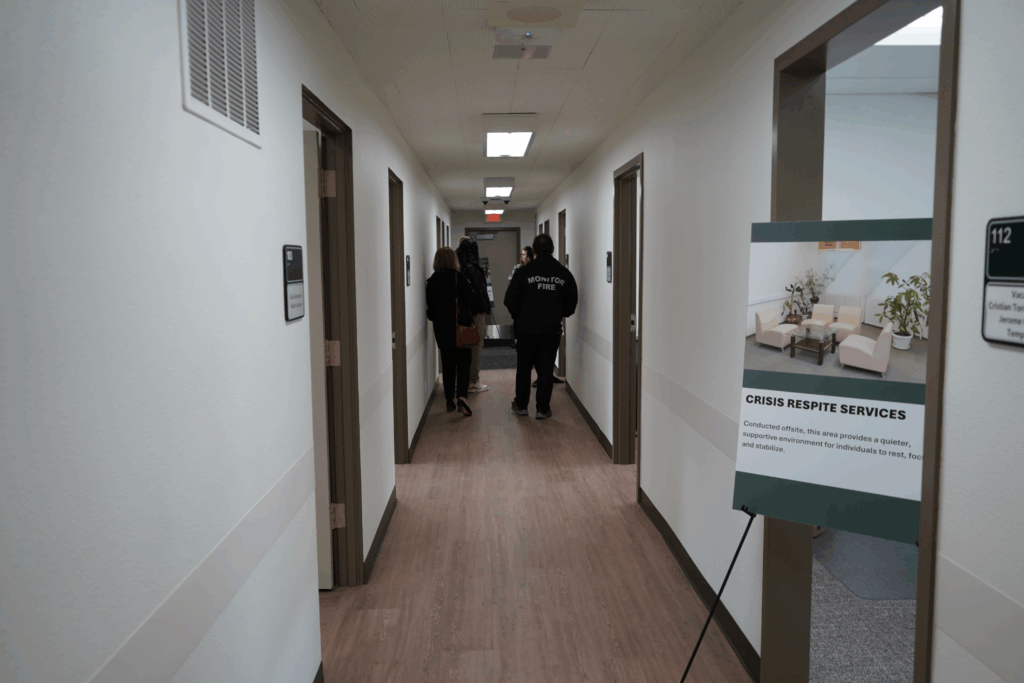When someone walks into the Marion County Behavioral Health Crisis Center, they’re often asking for help.
As of Oct. 30, they’ll be walking into a bigger, more welcoming environment with more ways to get that help under one roof, said Debbie Wells, director of the county’s Behavioral Health Crisis Services Division.
The crisis center, which was previously on the Salem Hospital campus, has moved to a larger, newly renovated building at 1234 Commercial St. S.E. It has 31 offices, six screening rooms, and three clinical spaces. It’s four times bigger than the old location, Wells said, which was at 1118 Oak St. S.E.
“The expansion fully was driven by wanting to increase accessibility for individuals. And the more people we can serve, the better,” Wells said.
The move coincided with the 30th anniversary of the crisis center’s operations, and included a name change from the Psychiatric Crisis Center. The new name reflects their ability to help people whose crisis stems from substance abuse rather than just mental health, Wells said.
As with the old location, anyone can walk in 24/7, or be brought in by law enforcement, and will be greeted by someone with mental health training. Then, they’ll be evaluated by a qualified clinician to determine what’s causing their crisis. The team will then work to get them stabilized before referring them to a resource in the community. Depending on their needs, that can mean ongoing psychiatric treatment, help with housing and benefits, or substance use treatment.
The Oregon Health Authority paid $2.9 million for the project.
“Marion County’s Crisis Center has been a cornerstone of crisis care for decades, and OHA is proud to help expand its reach and impact for the next generation,” said the health authority’s Behavioral Health Division Director Ebony Clarke in a statement.
In the last year, the center served 3,300 people, provided 23,000 documented services and received over 30,000 calls. Of those calls, 7,000 people were experiencing a behavioral health crisis.
The new location includes a new option for patients in the community: two crisis stabilization rooms, which are sometimes called “23-hour beds.” Wells described it as a recliner in a private room for someone amid a substance use or psychiatric crisis. That provides another option outside Salem Hospital for people in crisis.
“These are people that don’t have the need for inpatient hospitalization, or they don’t need to go to the emergency department… we can provide them a space to be while they either get a good night’s rest or have a warm meal, whatever that looks like for some people,” Wells said.
 On Oct. 27, Marion County held a ribbon-cutting ceremony and tours of its new Behavioral Health Crisis Center, which put staff under one roof and quadrupled service space. (MARION COUNTY photo)
On Oct. 27, Marion County held a ribbon-cutting ceremony and tours of its new Behavioral Health Crisis Center, which put staff under one roof and quadrupled service space. (MARION COUNTY photo)
The new building also spreads arrivals out, with separate entrances and waiting areas for youth, adults and people brought in by law enforcement. Previously, they’d all share a lobby.
“We see a big variety of people. And so if you’ve got somebody who’s experiencing a very significant mental health crisis, or behavioral health crisis, and then we have a youth that’s coming in, that can feel a little daunting,” Wells said. “Larger spaces and spreading people out enhances our ability to deescalate and stabilize people.”
The bigger building also means that Wells’ staff are under one roof, and the next step in someone’s journey is more likely to be down the hall rather than scheduling an appointment across town.
“It just allows for much easier collaboration and coordination to get people connected,” Wells said. “If we can do a warm handoff, we’re much more likely to be successful with an individual than if we have to schedule them an appointment or have them go somewhere else to receive a service. We can do it all right here.”
The old space was small enough that when a staff member needed help with a client they could just call out. Now, there are alert buttons on each desk, and lanyards with portable buttons that will send an instant text to the leadership team and security with their location.
Wells said that the space looks more professional, too, with a welcoming appearance that respects the work done there. Though they’ve been there less than a month, she expects the new space will expand their impact and have more people using their services.
Anyone, even if they don’t have insurance, can walk in and access the services at the clinic for free, or call 503-585-4949 for help over the phone.
”This is where people need to go. We want to reduce our burden on our law enforcement partners and our hospital partners, and make sure that people know that we’re here, and we’ve got a beautiful building that we want to welcome them to,” Wells said.
 Outside the new Marion County Behavioral Health Crisis Center at 1234 Commercial St. S.E. (MARION COUNTY photo)
Outside the new Marion County Behavioral Health Crisis Center at 1234 Commercial St. S.E. (MARION COUNTY photo)
Contact reporter Abbey McDonald: [email protected] or 503-575-1251.
A MOMENT MORE, PLEASE– If you found this story useful, consider subscribing to Salem Reporter if you don’t already. Work such as this, done by local professionals, depends on community support from subscribers. Please take a moment and sign up now – easy and secure: SUBSCRIBE.

Abbey McDonald joined the Salem Reporter in 2022. She previously worked as the business reporter at The Astorian, where she covered labor issues, health care and social services. A University of Oregon grad, she has also reported for the Malheur Enterprise, The News-Review and Willamette Week.

